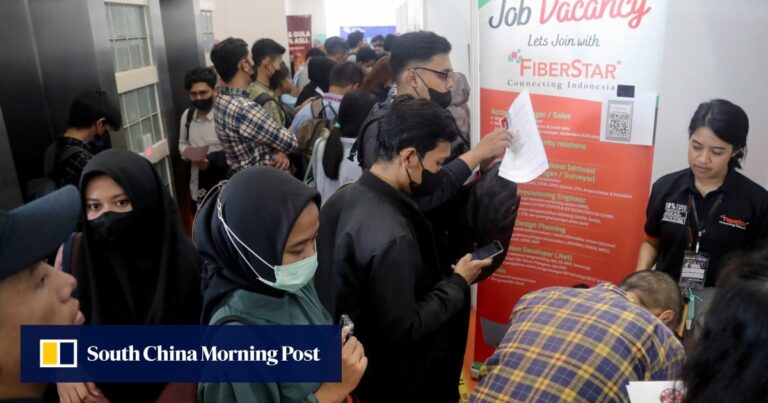“Some of my friends who didn’t find job placements right out of college are also struggling…now we’re going to have to compete for jobs with the [new students] who are graduating this year.
Ferdy is among 10 million Indonesians from Generation Z – born between 1997 and 2012 – who are unemployed and not enrolled in any formal education or training programs, according to a recently released report by Statistics Indonesia (BPS).
The report also reveals that unemployment among people aged 20 to 24 has been increasing in recent years, from 12.86% in 2015 to 17.02% in 2022.
This figure is significantly higher than the country’s average unemployment rate of 5.45% in February 2023, meaning that unemployment is particularly high for the youngest age group.
Experts have warned that having so many young Indonesians in a state of inactivity – neither working nor studying – could lead to demographic challenges and an unemployment crisis in the years to come.
According to Dewa Wisana, a demographer at the University of Indonesia, the country is currently experiencing a demographic dividend, with more than 70% of its population in the 15-64 age group, “of working age.”
In March, Indonesian President Joko Widodo said the government was determined to capitalize on that dividend.
“I have said many times that our country, Indonesia, has a great opportunity, great potential to become an advanced country when we reach the peak of the demographic bonus in 2045,” he said.
Jakarta hopes to achieve developed country status within the next two decades under its “Golden Indonesia 2045” vision, and the government is counting on young people to drive economic growth.

However, experts warn that despite the economic opportunities presented by Indonesia’s current demographic landscape, job creation has not kept pace with the growth of the working-age population, contributing to this high youth unemployment rate.
“There are not enough jobs currently available to young people,” Dewa said. “Data shows that the length of time it takes for those leaving university to find a job has also increased and takes at least nine months, almost a year.
“So there are more and more qualified students competing for fewer and fewer jobs,” he said.
Indonesia is therefore likely to see higher unemployment among skilled and educated workers in the coming years, he added. In the long term, the government may be forced to provide more social assistance to this group, amid concerns over Indonesia’s financial capacity to do so.
The BPS report found that more than half of the 10 million Gen Zers who are unemployed and not enrolled in school come from urban areas.
The data also shows that 5.72 million women and 4.16 million men are women. According to experts, this is because pre-existing social norms in the country make it more common for young women not to seek formal employment and instead take on household responsibilities.
Yulia Putri, from Bekasi, told This Week in Asia that she hoped to pursue higher education and become a nurse, but her family needed her to support their catering business.
“Maybe I can go back to school later,” the 21-year-old said, adding that she also helps care for her three younger siblings.

Experts cite several factors contributing to the lack of job opportunities for young people in Indonesia, including the Covid-19 pandemic which has led to an increasing shift towards more informal work.
Indonesia’s industrial sector has stagnated over the past decade, with manufacturing in particular creating fewer jobs, according to Dewa.
“There is also a mismatch… the type of training and education that students receive in school does not match the demand of the labor market, especially in terms of digitalization and technology,” he said.
Dewa called on the government to improve education and vocational training to meet the needs of the industry.
The government has launched several programmes to support youth employment, including the Merdeka Belajar Kampus Merdeka (Freedom to Learn, Independent Campus) initiative which requires students to undertake internships, and the Prakerja Card upskilling programme for citizens over 18 who are unemployed and not enrolled in school.
But for now, young college graduates like Ferdy are hoping to make a breakthrough in a tough job-search landscape.
“The rejections are very discouraging for me and my family,” he said. “I hope I can find a job in my field soon.”


